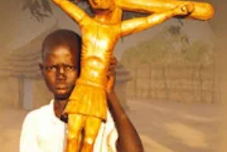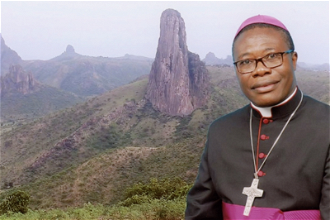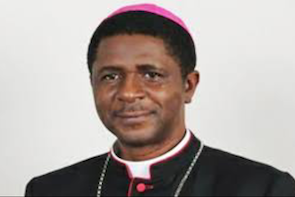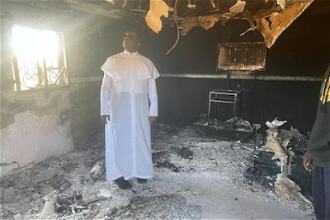Viewpoint: Will the Catholic Church Play Peacemaker in Cameroon?
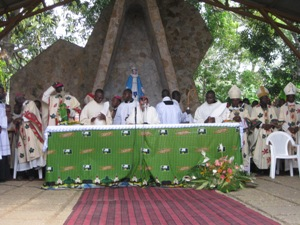
Rebecca Tinsley
Since 2016, Cameroon, the West African state most famous for its soccer prowess, has descended into conflict. With the country voting in an already discredited presidential election on 7 October, the need for strong leadership from the Catholic Church has never been greater.
The roots of the conflict
Cameroon's English-speaking minority claims it has been increasingly marginalized by the Francophone majority since gaining independence. Of 32 cabinet members, only one is Anglophone, even though English speakers represent 20% of the population. In 2016, the government tried to impose Francophone judges in the Anglophone region's courts, and to force the French language on its schools. This led to peaceful civil protests such as strike days when shops and schools closed. The authorities responded with disproportionate force, inadvertently fueling a militant secessionist movement. An example of this heavy-handed reaction, as reported by the impartial human rights watchdog, Crisis Group, was a government helicopter hovering over a church, shooting unarmed worshippers as they emerged.
The conflict deepens
The security situation is deteriorating rapidly. Dozens of secessionist leaders who were detained in January remain incommunicado, adding to Anglophone grievance. A recent Amnesty report describes the army's scorched earth tactics, with 106 villages in the North West and South West regions raided, looted, and burned. Their ethnic cleansing strategy is working: 200,000 have fled into the bush, while 20,000 are in refugee camps in Nigeria.
Social media heightens the sense that English-speakers are being persecuted. Stories of government soldiers torturing and humiliating Anglophones are common, as are disturbing videos of human rights violations circulating online. In this tense atmosphere, there are rumours that political prisoners are being sprayed with chemicals that make them unwell. Cameroon authorities have reportedly denied visas to the International Committee of the Red Cross. On September 10th, soldiers demanded that doctors at Bamenda hospital hand over wounded patients, suspecting them of being rebels, rather than civilians caught in cross fire. There are also unconfirmed reports from the Africa-based Centre for Human Rights and Democracy that the government now requires Anglophones to have internal travel permits. Amnesty estimates 400 people have been killed, although sources in Cameroon believe the figure is much higher, claiming that there are mass graves in the bush.
The authorities' harsh response to early peaceful protests has led to a polarization of opinion within the besieged Anglophone community. Secessionists are now using extreme violence, targeting security services and government representatives, and punishing civilians who fail to back their vision of a new independent Anglophone country called Ambazonia. Schools not participating in the general strike are being attacked, with 70 torched since 2016. Teachers and students have been seized, and parents are withdrawing their children from schools. The principals of several secondary schools have been kidnapped as retribution for keeping schools open. On an anecdotal level, a Catholic nun reports to your correspondent that her town is surrounded by forces from both sides, effectively holding civilians hostage; people who have fled to camps fear imminent attack; and members of the Diaspora worry constantly about the safety of their family back in Cameroon.
Although the Anglophone Diaspora has appealed to the UK, its former colonial power, it is clear from answers to Parliamentary questions from Lord Alton among others that Britain will go no further than appealing for dialogue. In the run up to Brexit, establishing trading relations is a priority; in June, the government announced that UK interests had signed a natural gas deal with Cameroon worth £1.5 billion. Furthermore, the international community is unlikely to apply pressure to Cameroon's leader, Paul Biya, while his country's troops are battling the Islamist terrorists, Boko Haram, in the Lake Chad region.
What can the Catholic Church do?
The church commands the respect of all sides of the population; it is seen as a legitimate voice of civil society. From the beginning of the current crisis, Anglophone faith leaders have called for inclusive talks aimed at finding a peaceful, federal approach, devolving some powers to disenfranchised English-speaking regions. These calls were first ignored and then rejected by Biya's government. As secessionists have adopted increasingly violent means, the Francophone authorities have hardened their position, refusing to negotiate with terrorists.
The 85-year-old Biya will most probably be re-elected in October, after a process that will fail to meet international standards of free and fair elections, as it usually does in Cameroon. Observers fear that the closing days of the election campaign may spark even more violence. Biya, who has been in power since 1982, seems determined to ignore Anglophone calls for dialogue. Meanwhile, it is noticeable that few French-speaking faith leaders have expressed solidarity with their opposite numbers in the Anglophone region, or have put pressure on Biya to compromise.
In November there will be a conference of faith leaders, convened by the Anglophone churches. This is an opportunity for French-speaking Catholics to join moderate Anglophones in calling for inclusive dialogue to resolve the country's crisis by non-violent, constitutional means. The church is in a unique position, with the moral authority to push the government into negotiations. The continuing disengagement of many Francophone faith leaders is unhelpful at best. While brave Anglophone priests and bishops demonstrate the courage to seek a peaceful and moderate way forward, they deserve the active support of their fellow religious leaders among the French-speaking majority.



